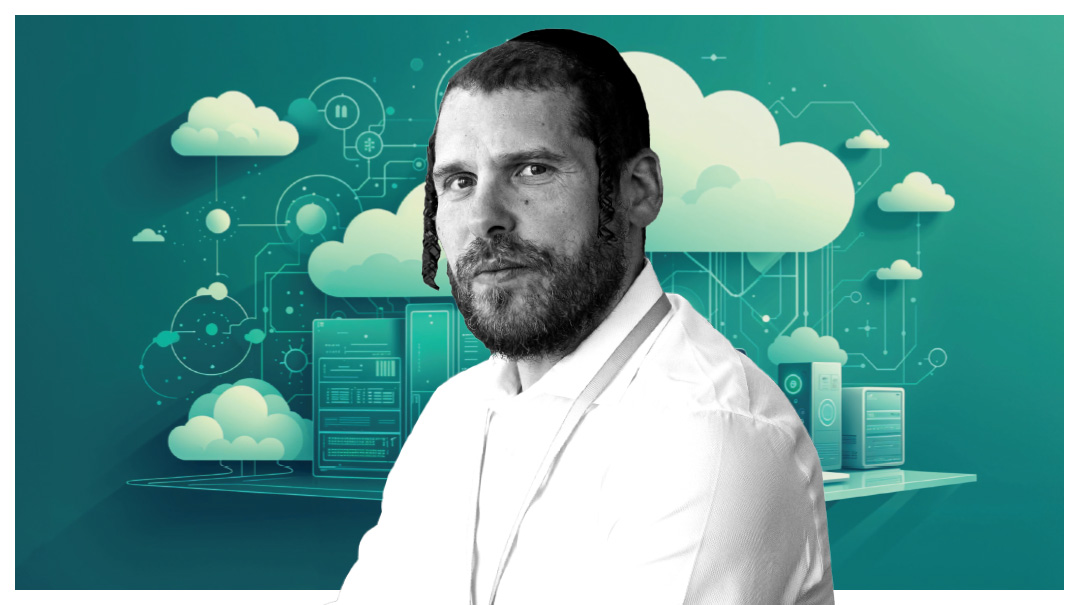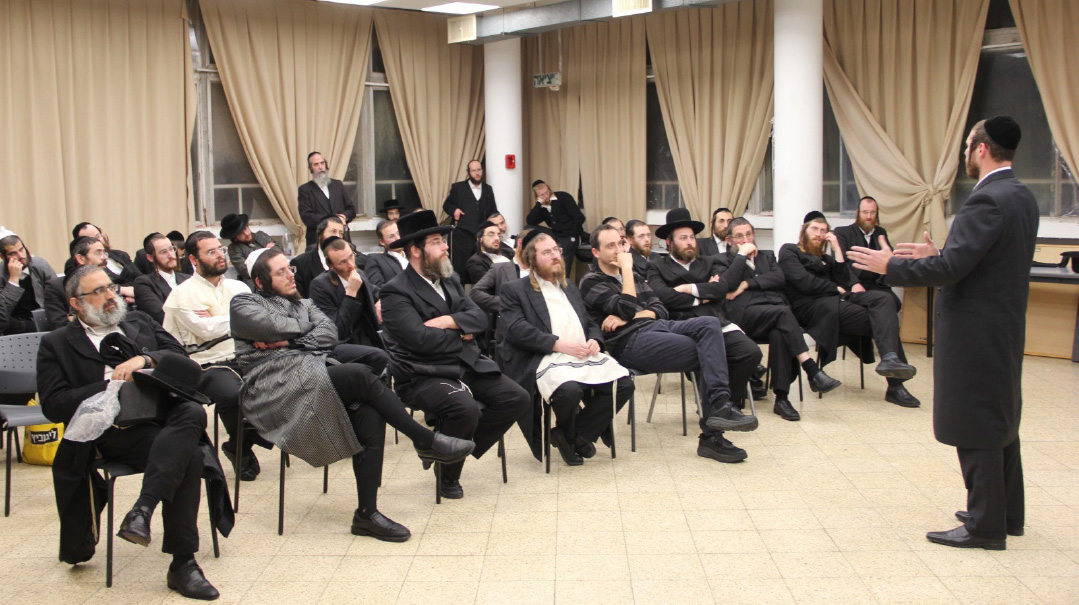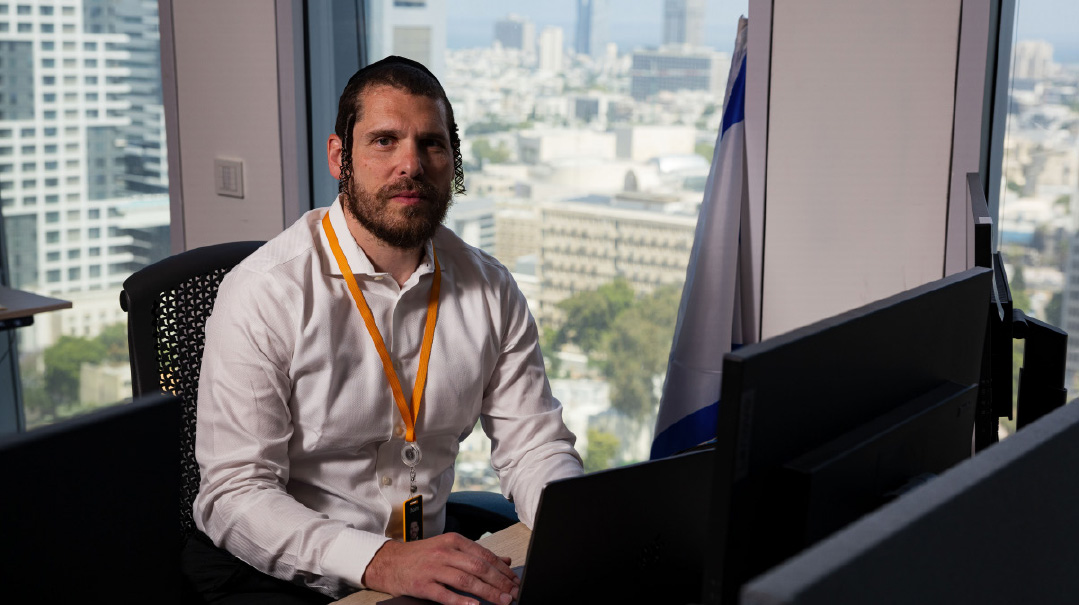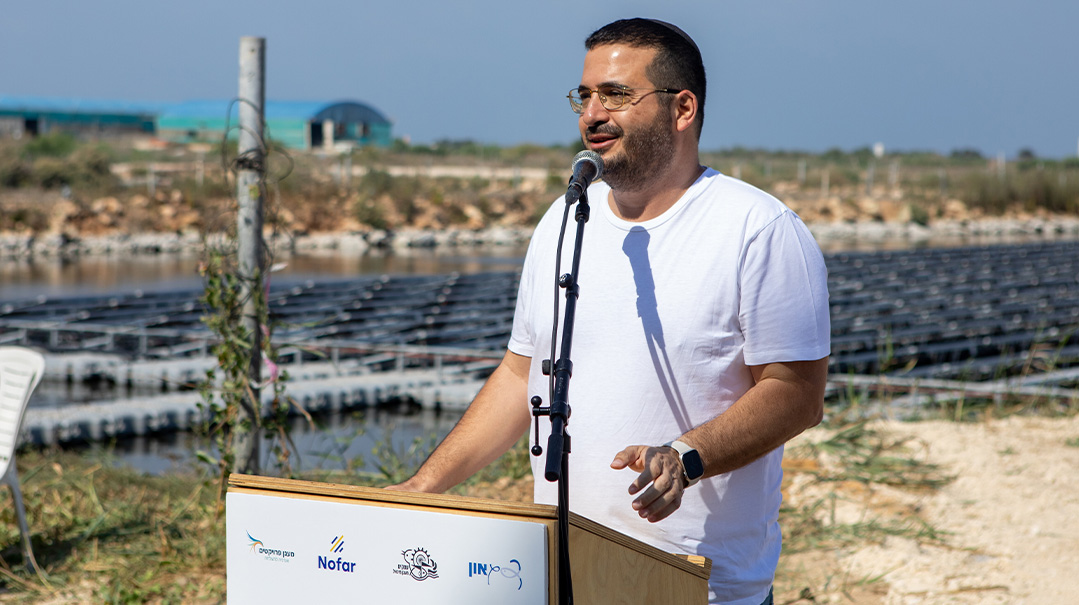Reaching the Clouds

For chassidic techie Chaim Landau, uploading chareidi tech power is win-win

Photos: Elchanan Kotler
Chaim Landau traveled a long way from his origins in Williamsburg to Silicon Valley to his new home in Jerusalem. Now he’s deeply gratified to be able to give back to his own, watching all the pieces come together
T
he sun glints off the skyscrapers on this warm morning in Tel Aviv, and I squint as I look up at Israel’s tallest building, the Azrieli Sarona Tower on Begin Road. It is home to hundreds of international businesses like Citi and Meta (Facebook), with several floors dedicated to a business hotel.
I head for the 28th floor, home to the offices of Amazon Web Services (AWS), where I’m scheduled to meet Chaim Landau, principal cloud delivery architect at AWS.
Emerging from the elevator, I take in the colossal view of the city and the surrounding ocean, before Landau, who, with his trademark curled peyos, looks rather different from the others here, takes me for a quick spin around the floor. We pass tens of meeting rooms, presentation rooms, and conferences in progress. In a large open area, people sit at computers, some in green army fatigues, plugging away.
“My team,” Landau says, indicating the team he leads.
They are working on a multibillion-dollar contract with the Israeli government, a cloud computing project called Project Nimbus.
“What is the cloud?” I ask of this principal cloud delivery architect, feeling sheepish. But he isn’t perturbed.
“They all ask,” Landau says easily. “Think of charging your phone in an electric outlet versus building your own electrical circuit for your phone. The latter will take you time, won’t be as good, and the outcome for your phone will be the same — charged.”
The cloud, he explains, is like plugging your phone into the wall. It’s all set for you, so you just pay for the electricity you use and you don’t waste your time doing things that bring no direct value to your business — things you have no business doing, like creating circuits. Essentially, the cloud gives you, a big business, the technology you need — things like quick testing of programs and solutions, artificial intelligence, or machine learning — without you breaking a sweat.
AWS coined the phrase “undifferentiated heavy lifting” — if you’re a bank or a pharmaceutical company, you shouldn’t have to spend time building technology that doesn’t make you a better bank or help you design better drugs. If the tech company does that, you can use their services and instead focus on building better banking software or designing better drugs.
“Ironically, doing the undifferentiated heavy lifting for others is what differentiates AWS,” Landau concludes.
Williamsburg Meets Silicon Valley
It was 2016, and Chaim Landau, a technology consultant with 18 years of high-tech experience in varied capacities in companies like Northwell Health, Gotham Technology Group, and Qlik, was working as a sales engineer at Dell when Amazon Web Services reached out to him to see if he might be a good candidate for a cloud architect.
Always interested in new opportunities, he went for the interview, not realizing what a big deal it was until he found himself going through what they call the “loop”: five different teams of two who each spent 45 minutes interviewing him.
While Landau entered the interview rather noncommittal, he quickly found himself intrigued.
“They started firing questions I never encountered before: Tell us about a time when you dealt with a real challenging technical problem, and how you went about solving it. They wanted to hear about the complex issues, focusing on them extensively until they had no questions left. Answering their questions was like telling stories. The conversation was on another level, and it was then I realized I very much wanted to be a part of it.”
Landau’s enthusiasm was reciprocated, and he was offered a position with AWS Professional Services. He soon found that the work reflected the loop’s grueling energy — a high stimulation environment, pushing hard into new frontiers, constantly edging him out of his comfort zone. He moved quickly through the teams to become a cloud infrastructure architect and was then promoted to the senior level within that role.
AWS services major clients worldwide, and Landau led the strategizing, design, and execution for companies that wanted to adopt the cloud. He and his team flew around the States helping companies design and build their clouds, about 20 trips a year. He’d walk into meetings with Silicon Valley executives who head companies servicing tens of millions of users, with his chassidish garb and all.
“They’d always do a double-take when I walked into the room. It was my challenge, to change their first impression.”

Chaim Landau at an open house with potential students
On to the Promised Land
During Covid, Landau worked remotely. He won the 2020 Most Innovative Solution of the Year, an internal Amazon award, for a major project that helped keep Amazon warehouses open during the global pandemic. One day, he was on a Zoom call with someone who was working from the beach. That got Landau thinking.
“You know, if I could work from anywhere, I’d want to live in Eretz Yisrael,” he told his family.
Unlikely, his wife and kids thought. Both he and his wife are from Satmar families and had lived in Williamsburg all their lives; their parents, siblings, children’s schools — everyone and everything was there. Yes, he traveled for work, but Williamsburg was home.
Landau agreed his plan wasn’t super realistic, but he allowed himself to dream.
In 2021, the Israeli government signed a contract with AWS for Project Nimbus, a cloud computing project of the Israeli government and its military, and the Amazon tech team began looking for a senior within the company to help build a professional services team and lead it from their Tel Aviv premises. Liran Yemini, now a data architect on Landau’s team, wrote a Python script to search Amazon’s database of hundreds of thousands of employees, looking for specific skills and an interest in Israel. They found Landau.
“Years earlier, when I first joined AWS, I was looking for a Jewish community to join on Amazon’s social network. Not finding any, I joined one called ‘Israel’ that was designed for Israelis, and I literally never interacted with anyone in that community, because it was unrelated to my work,” Landau says. “But that Python search picked up on me specifically because I had the skills it was instructed to look for, and I was in that ‘Israel’ group. It was unbelievable hashgachah.”
Once again, Landau was subjected to a grueling loop interview, this one ten hours long, after which he was offered this new post. It was a dream come true — but could he move his family, find a new home and new schools, and leave his extended family and community behind? He was in a quandary.
“It was one of the most challenging decisions, yet we felt in a way that the decision had been made for us,” Landau remembers. “The way the opportunity presented itself, the way the obstacles of moving an entire family seamlessly cleared themselves out of the way, I felt my hand held by Hashem throughout. The offer came in by June, and I knew that if we were going, we had to be there at the beginning of the new school year. In two months, everything was sorted.”
For his three daughters, aged 7, 16, and 19 (he has another two married children in New York), it was absolutely huge — new schools and a new culture.
“They were challenged,” he says, “but they grew a lot. My 16-year-old daughter describes moving here as the hardest yet best experience, opening her eyes to new people and ways of doing things.”
Providential Encounter
Before his first Rosh Hashanah in Israel, Landau needed to buy a new machzor. He asked someone for directions to the nearest bookstore, and the two struck up a conversation.
“Lipa Fekete,” the other man said, introducing himself to Landau.
In the course of their conversation, Fekete tmentioned his father-in-law’s involvement in the organization Melachtom. Funded by Americans Ahron Margulies and Reuven Wolf, Melachtom was launched in 2018 to help chareidim in Israel gain marketable skills. To date, over 500 men have been trained in fields like architecture, general contracting, and accounting.
Landau’s interest was piqued.
“I could appreciate the problem, and I was looking for my ‘chesed card,’ so to speak. Just before I left America, I got involved in a charity campaign and used my Amazon skills to successfully raise close to a million dollars in three months. After that, I wanted to help other Yidden in a meaningful way, and I was actively looking for a way to do so.”
Landau began wondering if he could help Melachtom by arranging and overseeing a course in Cloud DevOps, which would give chareidi men a highly sought-after skill set in today’s climate, one with growing demand in Israel. From his own experience, Landau has seen that yeshivah graduates are particularly primed to succeed in the tech field, as years of learning Gemara have honed the problem-solving skills and discipline needed.
Over the next few months, as Landau tried to bring his idea to fruition, he’d learned a lot about working in Israeli secular society. He’d been prepared for hostility, but was pleasantly surprised at what he actually found.
“The work itself is an equalizer,” he says. “Everyone in this field just wants to learn. Personally, when I came to work in the tower, I suddenly had this feeling that I should put my peyos down like the chassidic person I am [until then he kept them up at work]. I was in Israel now. I didn’t have to pander to anyone. They know who I am: a brother. When I did that, I felt like someone gave me my peyos back. It’s just different when you’re working with Jews. Even if there are huge differences, there are no real walls. A Jew is a Jew is a Jew.”
By the time Landau met with the Melachtom executives a few months later, he felt a lot more confident about his plans to bring chareidim on board to the primarily secular cloud development industry and that the secular Israeli world would not only handle this influx, but embrace it.
Landau sat with Melachtom representatives from various kehillos, including Gur, Satmar, Toldos Aharon, and Breslov, to explain his plan to offer a Cloud DevOps course. He then hosted an open house and began carefully vetting interested candidates.
“I saw passion and curiosity,” he says, adding that he has great hopes for this group, who can use their newfound skills to go in many directions because the IT field is vast and offers much opportunity.
“There are heimish tech companies in the US that can outsource work to Israel, or even extend their operations in Israel,” Landau elaborates. “Or the men can work for the government, which is constantly talking about bringing chareidim into the workforce. Here’s their chance to bring in bright people with invaluable skills. It’s a win-win.”
If chareidim in Israel establish themselves as a tech power, Landau posits, there’s no reason they can’t stay in their natural environment while commissioned by the government, who can cater to them without threatening their way of life by addressing cultural challenges like gender separation and kashrus.
“There’s been a huge success with chareidi women in the industry,” he says. “Why not the men?”

It All Began with Pac-Man
Landau’s interest in programming goes as far back as when he was just a young boy of eight or nine.
“My uncle had a Macintosh computer that could do little more than play Pac-Man, but I was in awe of the machine. It was the first successful all-in-one desktop personal computer with a graphical user interface, built-in screen, and mouse,” Landau explains — and it blew his young mind.
“There was a program inside. How did it get there? How did it understand the commands? What was this thing?”
It would be years until he’d see a computer again. Meanwhile, young Chaim grew up in a home where money was perpetually tight, and he was determined to do something. He looked for whatever opportunities presented themselves to earn money: binding seforim, folding towels, or carrying boxes for his uncle who was in charge of the Satmar mikveh on Rodney Street.
“It wasn’t the money I was after — I wanted security,” he says of those early challenges that formed him.
The home he grew up in instilled intelligence and deep confidence in themselves and one another.
“My father’s study features bookshelves stacked floor to ceiling, double-piled, and he always has something he’s studying in his hands. That tremendous intellectual curiosity is something he inspired in me.”
His mother gave him what he calls silent strength.
“I never heard her complain, not then, not today. She was the one who taught me how to be a man. She taught me how to hold a hammer — and how to pick it up again after banging my finger.”
When Landau turned 15, things took a dramatic turn in his life.
“I was thrown out of yeshivah for a crime I didn’t commit, and I didn’t have where to go.”
He was at a loss for what to do next, but his grandmother told him she had signed him up for the Satmar yeshivah in Montreal.
“She was a strong, feisty woman, a saleslady at work, and she had the last word at home,” Landau remembers. “She didn’t consult with me, but told me I was going to Montreal.”
When he got there, the teenager was in for a shock. He’d been a decently popular kid until then, but here no one knew his name. “It was the first of many Lech lecha mei’artzechas. No parents, no siblings, no friends. No one had expectations of me. No one spoke of my ‘potential’ or ‘kishronos.’ For the first time, I had to face myself — and I didn’t like that person I saw, someone who just didn’t pick himself up by his bootstraps. I knew deep down that I could do much better. That’s when I really started learning.”
Rabbi Moshe Menachem Tyrnauer, the rosh yeshivah and a dayan in the Satmar Montreal community, was one of Landau’s biggest inspirations.
“I learned so much from his unbelievable discipline. He’d sit in one place and work through the sugya with tremendous focus, all while there was hard stuff going on in his life. In his discipline there was a strength, a reining in of the mind and the heart.”
That sort of diligence stood Landau in good stead for the rest of his years in yeshivah and kollel. It also helped him later in high-tech, where you have to sit and solve problems all day.
“It’s a field where you need hasmadah and advanced problem-solving skills,” he explains.
Breaking In
After getting married, Landau joined a kollel, but he was preoccupied with thoughts about how he would support a family. His father had had a quilt and bedding store, and seeing how retail was so dependent on the capriciousness of sales, Landau wanted to learn a skill, to turn himself into his biggest asset.
One day, a friend told him about an open house for courses at a private school in Manhattan that offered training in various technologies. On the spot, Landau decided to join, and he and his friend signed up for a nine-month program to learn Novell, a server operating system (it is no longer in use).
“In retrospect, it was naive and clueless of me,” Landau says ruefully. “I hadn’t researched the school or the industry, I just went with what presented itself. But Novell was purportedly the easiest option, and we had zero skills or knowledge, just interest. I’d painstakingly saved up $10,000 by then, and I took $1,200 of it and bought a computer I didn’t know how to use. Most of the rest went toward the cost of the course.”
The program was a self-paced course that was projected to take the better part of a year, but Landau and his friend went all in, and aided by Computers for Dummies and a dictionary to supplement their rudimentary command of English, completed it in three months, passing ten tough exams in the process.
Earning that certification was thrilling, Landau recalls, but then reality hit. Who would hire him? Each Sunday, he’d look at the job postings in the New York Times and fax his résumé to any relevant post. It was 1998, just before Y2K, and there was a proliferation of offers as companies scrambled to replace their computer systems before the turn of the millennium. But while Landau landed interviews easily, job offers didn’t follow.
“I’d walk in and the interviewer would take a look at me — this chassidic kid — and they’d rush through the interview, going through the motions, their body language indicating that it was over before it began. I had no idea how to be in the outside world, no presentations skills, plus my language was still poor. It wasn’t about computer skills, but how I showed up.”
At an interview for the most basic of jobs, Landau felt he had hit rock bottom. A computer consultancy company that was replacing computers for Beth Israel Medical Center needed someone to insert IP addresses and then to sign off that it was done.
“I couldn’t believe he wouldn’t take me for even this job,” Landau remembers. “I found my voice and said, ‘How about I take on this work for free? If you don’t like my work, you never have to speak to me again.’ He couldn’t say no to that. When I turned up the next day, they all knew I was the crazy guy who was working for free.”
The job was as basic as it was made out to be. One day when there wasn’t enough work for the team, they were handed Windex and told to clean the computer monitors. But there was one bright spot: Once a week, the team was sent out in pairs around Beth Israel to solve whatever problems had cropped up with the hospital’s computers. Landau was paired with the team leader, who soon realized Landau had Novell training, which was the system the hospital was using.
Then the consulting company that had hired Landau was approached by another hospital, Northwell Health in Long Island, which was looking for someone with Novell server skills. The team leader told his superiors about Landau, and they decided to send him to interview for the role of desktop support technician.
“I felt this was my ticket. I’d been recommended by the company I was working for. But I also knew the feeling of having so many doors closed. Before I went in there, I read up on how to interview, how to connect, to demonstrate your worth. I had a good dose of naivete and spoke earnestly to the interviewer, ‘Bob, you really need people like me, I promise I’ll make you proud.’ He burst out laughing, but he hired me.”
That was Landau’s first real break within the field. Northwell Health had 30,000 computer users in the hospital. It was a real learning curve, but he did well, and before long, the hospital wanted to hire him directly, not via the consultancy company.
“That should’ve been a problem, because we had to sign a noncompete contract regarding working directly with the company’s customers,” Landau recalls. “But I’d never signed a contract, because I’d started working there for free!”
Moving Along
Those first years weren’t easy, mainly because Landau was still learning to navigate the culture barrier.
“I dressed differently, I ate differently, I had to leave early on Fridays — and practically speaking, I knew nothing about the culture outside of the chassidish world,” he says.”
An extrovert by nature, Landau learned quickly, identifying behavior patterns and picking up nuances of etiquette. His language improved dramatically, and soon his presentation was far more polished. But it took longer to sort out how he felt about himself vis-à-vis the corporate world.
“It wasn’t them, it was me. It took me a long time to be comfortable as my authentic Jewish self, with who I was and the kind of Jew I was,” he says. “I wish I could’ve had that confidence earlier, but it’s hard. Twenty-five years ago was nothing like today’s world of easy acceptance of and diversity. Plus, I was working in Long Island, which is WASP-y, all the way.”
To their credit, the team at Northwell welcome Landau with open arms.
“Even though I was a foreign entity to them, they liked me, and I learned a lot there.”
Landau spent six years at Northwell.
“I’d often take on new things when nobody else would. When the home care department wanted to build a new technology called Citrix, and the manager asked who was game, I waited to see if my seniors would take it, and when they didn’t raise their hands, I did. And I got it.”
At some point, Landau was sent to a training program to learn VMware, his introduction to virtualization technology. Brian Wagner, senior architect at Gotham Technology Group, was his partner for the five-day course.
“On Friday, the last day of the course, Wagner asked me if I was happy at my job, and he asked for my résumé. After Shabbos I saw that his company had tried to call me. I called them back on Monday to set up an interview. By now I knew what I was doing, and they hired me on the spot.”
That was his ticket out of the hospital, something he had known he’d have to find eventually. Someone he worked with at the hospital had advised: Never stay where you learned. Leave your first job, because they’ll regard you differently in the new place. Now it was time.
Gotham was, in Landau’s words, “a small pond with big fish.” It’s a small consultancy with big clients: banks, hedge funds, pharmaceutical companies.
“If my career was born in my job at the hospital, Gotham was where I grew up,” Landau says. “The decade I was with them was absolutely formative. I suddenly became a consultant. I had to design the blueprints for systems, write them up, and then present them.”
On one of those early days, he remembers staring at a blank screen. He had the idea all figured out, but how would he write it up?
“Then I just started typing and realized, hey, I have writing skills. I mean I should’ve figured, my father’s a writer, but I hadn’t done any writing up to that point. I was almost 30 but just had no idea that I was good at writing,” he muses. “That was hard, to feel that there was a part of myself it took me so long to find out about.”
As the face of the company for clients, Landau found himself presenting a lot. “More than anything, what I acquired at Gotham was soft skills, people skills, problem-solving skills. These I could take anywhere.”
After 11 years, when they allocated him four weeks for a project and he completed it in two, Landau realized it was time to leave. He had a fully developed skill set now; it was time to move on.
It was certainly easier this time. The young man who’d begged his way into his first job was now being sought out by the top. Qlik, a big data company, reached out to him, and he started working with big data. Then Dell approached him, and he took a job with them as a sales engineer, selling specialized devices.
“I didn’t particularly have sales experience, but it was like everything else — I had no business taking each job I took,” he says, half-laughing. “But that’s how I grew.”
As a kid, Landau was putting his dollars in a money-saving gemach.
“It was part of the insularity,” he says, “I just did what my sister, who saved her paychecks there, did. I’d come with my quarters and dollar bills, and the older man who worked there would get annoyed at me week after week, saying, ‘Why do you bother me with your small money, boy?’”
Today, he’s a long way from there: out in the corporate world, rising through the ranks, and extending a hand from the top of the ladder to help other chareidim ascend.
(Originally featured in Mishpacha, Issue 1014)
Oops! We could not locate your form.







